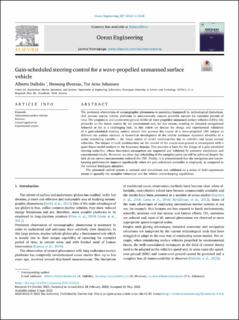| dc.contributor.author | Dallolio, Alberto | |
| dc.contributor.author | Øveraas, Henning | |
| dc.contributor.author | Johansen, Tor Arne | |
| dc.date.accessioned | 2023-02-16T11:52:48Z | |
| dc.date.available | 2023-02-16T11:52:48Z | |
| dc.date.created | 2022-05-23T14:24:30Z | |
| dc.date.issued | 2022 | |
| dc.identifier.citation | Ocean Engineering. 2022, 257 111618-111618. | en_US |
| dc.identifier.issn | 0029-8018 | |
| dc.identifier.uri | https://hdl.handle.net/11250/3051464 | |
| dc.description.abstract | The persistent observation of oceanographic phenomena is nowadays hampered by technological limitations, that prevent marine robotic platforms to autonomously execute scientific surveys for extended periods of time. The propulsion and course-over-ground (COG) of wave-propelled unmanned surface vehicles (USVs) rely primarily on the forces exerted by the environment and, for this reason, ensuring an intended navigational behavior at sea is a challenging task. In this article we discuss the design and experimental validation of a gain-scheduled steering control system that governs the course of a wave-propelled USV subject to different sea surface currents. A theoretical investigation of the vehicle nonlinear dynamics identifies in a scalar scheduling variable
the major source of model nonlinearities due to vehicle’s and ocean current velocities. The impact of such nonlinearities on the control of the course-over-ground is investigated with a quasi-linear model analysis in the frequency domain. This provides a basis for the design of a gain-scheduled steering controller, whose theoretical assumptions are supported and validated by extensive simulations and experimental results. Moreover, we show that scheduling of the autopilot gains can still be achieved despite the lack of sea current measurements onboard the USV. Finally, it is demonstrated that the navigation and course-keeping performances improve significantly when the gain-scheduled controller is employed, as compared to the nominal fixed-gain autopilot.
The presented control system is assessed with simulations and validated on a series of field experiences meant to quantify the autopilot robustness and the vehicle course-keeping capabilities. | en_US |
| dc.language.iso | eng | en_US |
| dc.publisher | Elsevier | en_US |
| dc.rights | Navngivelse 4.0 Internasjonal | * |
| dc.rights.uri | http://creativecommons.org/licenses/by/4.0/deed.no | * |
| dc.title | Gain-scheduled steering control for a wave-propelled unmanned surface vehicle | en_US |
| dc.title.alternative | Gain-scheduled steering control for a wave-propelled unmanned surface vehicle | en_US |
| dc.type | Peer reviewed | en_US |
| dc.type | Journal article | en_US |
| dc.description.version | publishedVersion | en_US |
| dc.source.pagenumber | 111618-111618 | en_US |
| dc.source.volume | 257 | en_US |
| dc.source.journal | Ocean Engineering | en_US |
| dc.identifier.doi | 10.1016/j.oceaneng.2022.111618 | |
| dc.identifier.cristin | 2026605 | |
| dc.relation.project | Norges forskningsråd: 270959 | en_US |
| dc.relation.project | Norges forskningsråd: 223254 | en_US |
| cristin.ispublished | true | |
| cristin.fulltext | postprint | |
| cristin.qualitycode | 1 | |

